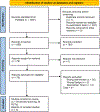Effect of Dietary Intake Through Whole Foods on Cognitive Function: Review of Randomized Controlled Trials
- PMID: 35334104
- PMCID: PMC11110908
- DOI: 10.1007/s13668-022-00412-5
Effect of Dietary Intake Through Whole Foods on Cognitive Function: Review of Randomized Controlled Trials
Abstract
Purpose of review: This review evaluated recent randomized controlled trials (RCTs) examining the chronic intake of whole foods associated with the Mediterranean, Dietary Approaches to Stop Hypertension (DASH), Mediterranean-DASH Intervention for Neurogenerative Delay (MIND), and ketogenic (KETO) diets on cognitive function.
Recent findings: We identified RCTs related to olive oil (N = 3), nuts (N = 7), fatty fish (N = 1), lean meats (N = 4), fruits and vegetables (N = 9), legumes (N = 1), and low-fat dairy (N = 4), with 26/29 reporting positive results on at least one measure of cognition. We also identified 6 RCTs related to whole food-induced KETO diets, with half reporting positive effects on cognition. Variations in study design (i.e., generally the studies are < 6 months and include middle-aged and older, cognitively intact participants) and small sample sizes make it difficult to draw conclusions across studies; however, the current evidence from RCTs generally supports individual component intakes of these dietary patterns as an effective, nonpharmacological approach to improve cognitive health in adults.
Keywords: Cognitive function; DASH diet; Ketogenic diet; MIND diet; Mediterranean diet; Whole foods.
© 2022. This is a U.S. government work and not under copyright protection in the U.S.; foreign copyright protection may apply.
Conflict of interest statement
Figures
Similar articles
-
The Mediterranean, Dietary Approaches to Stop Hypertension (DASH), and Mediterranean-DASH Intervention for Neurodegenerative Delay (MIND) Diets Are Associated with Less Cognitive Decline and a Lower Risk of Alzheimer's Disease-A Review.Adv Nutr. 2019 Nov 1;10(6):1040-1065. doi: 10.1093/advances/nmz054. Adv Nutr. 2019. PMID: 31209456 Free PMC article.
-
Mediterranean-Dash Intervention for Neurodegenerative Delay (MIND) Diet Slows Cognitive Decline After Stroke.J Prev Alzheimers Dis. 2019;6(4):267-273. doi: 10.14283/jpad.2019.28. J Prev Alzheimers Dis. 2019. PMID: 31686099 Free PMC article.
-
Mediterranean-style diet for the primary and secondary prevention of cardiovascular disease.Cochrane Database Syst Rev. 2019 Mar 13;3(3):CD009825. doi: 10.1002/14651858.CD009825.pub3. Cochrane Database Syst Rev. 2019. PMID: 30864165 Free PMC article.
-
Dietary Approaches to Stop Hypertension via Indo-Mediterranean Foods, May Be Superior to DASH Diet Intervention.Nutrients. 2022 Dec 22;15(1):46. doi: 10.3390/nu15010046. Nutrients. 2022. PMID: 36615704 Free PMC article. Review.
-
Mediterranean-DASH Intervention for Neurodegenerative Delay (MIND) study: Rationale, design and baseline characteristics of a randomized control trial of the MIND diet on cognitive decline.Contemp Clin Trials. 2021 Mar;102:106270. doi: 10.1016/j.cct.2021.106270. Epub 2021 Jan 9. Contemp Clin Trials. 2021. PMID: 33434704 Free PMC article. Clinical Trial.
Cited by
-
Associations of vegetable and fruit intake with cognitive function and its decline: Two longitudinal studies.J Nutr Health Aging. 2024 Jun;28(6):100223. doi: 10.1016/j.jnha.2024.100223. Epub 2024 Apr 9. J Nutr Health Aging. 2024. PMID: 38598978 Free PMC article.
References
-
- Flanagan E, Lamport D, Brennan L, Burnet P, Calabrese V, Cunnane SC, et al. Nutrition and the ageing brain: moving towards clinical applications. Ageing Res Rev. 2020;62:101079. - PubMed
-
-
Serra MC, Dondero KR, Larkins D, Burns A, Addison O. Healthy lifestyle and cognition: interaction between diet and physical activity. Curr Nutr Rep. 2020;9(2):64–74.
This review supports adherence to specific dietary patterns (MEDI, DASH, MIND) and a combination of aerobic and resistance exercise, both individually and combined, as an effective approach to mitigate age-associated cognitive decline. It highlights observational evidence between diet adherence and positive cognitive outcomes related to memory, executive function, and risk for cognitive impairment. It also highlights improvements in cognitive performance after exercise interventions regardless of baseline cognitive status and notes lower incidences of cognitive impairment in people who engage in regular physical activity.
-
-
-
van den Brink AC, Brouwer-Brolsma EM, Berendsen AAM, van de Rest O. The Mediterranean, Dietary Approaches to Stop Hypertension (DASH), and Mediterranean-DASH Intervention for Neurodegenerative Delay (MIND) diets are associated with less cognitive decline and a lower risk of Alzheimer’s disease-a review. Adv Nutr. 2019;10(6):1040–65.
A recent review summarizes the evidence examining an association between various dietary patterns (i.e., MEDI, DASH, and MIND) with cognitive decline, dementia, and Alzheimer’s disease (AD) across 56 studies. In general, the authors report that higher adherence to these diets is associated with better cognitive scores and lower risk for dementia and AD, where the strongest associations are observed for the MIND diet. For the components of these dietary patterns, the authors suggest that olive oil may be associated with less cognitive decline.
-
-
-
Vinciguerra F, Graziano M, Hagnäs M, Frittitta L, Tumminia A. Influence of the Mediterranean and ketogenic diets on cognitive status and decline: a narrative review. Nutrients. 2020;12(4).
This review highlights the existing research on the efficacy of MEDI and KETO diets against AD-related cognitive decline and focuses on the proposed protective mechanisms of action. It summarizes that despite the different underlying mechanisms, both MEDI and KETO diets demonstrated a beneficial role in reducing or delaying cognitive impairment. It predicts that information could be of help to better characterize the possible role of MEDI and KETO diets as nonpharmacological therapies in the treatment of AD and, more generically, of neurodegenerative disorders.
-
Publication types
MeSH terms
Grants and funding
LinkOut - more resources
Full Text Sources
Medical
Research Materials

